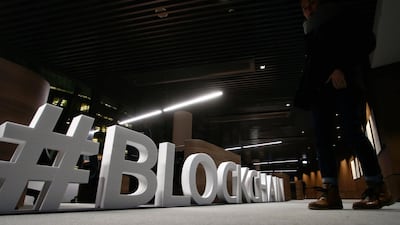Across the Arabian Gulf cities like Dubai, Abu Dhabi, Manama and Riyadh are vying to establish themselves as regional hubs for financial technology, or FinTech, amid a push to diversify their economies away from oil revenues. It has shaken up every corner of global finance and threatened legacy bank businesses.
What is FinTech?
Financial technology (FinTech) is a term that applies to financial services companies using technology to make it easier for customers to borrow, save and invest using a mobile device, the internet and the cloud quickly and easily without dealing with a conventional bank.
Fintech became a buzzword in the UAE financial services industry in 2017 as banks ramped up efforts to find digital solutions to make their businesses more efficient while keeping customers happy.
At the same time, the nation's two financial centres, the Dubai International Financial Center and the Abu Dhabi Global Market, both deepened their commitment to nurturing the nascent field with incubator and accelerator programmes designed to encourage fledgling fintech start-ups.
How have traditional banks responded to FinTech?
FinTech firms have caused a major upheaval for traditional banks so the big lenders are now joining the digital revolution. Goldman Sachs, for example, broke into the scene with Marcus, a mobile-banking app, and local banks like ADCB and NBAD offer their own apps as well. Some banks have started to fund accelerators, or programmes that foster FinTech start-ups with offices and seed money needed to develop new ideas they can adopt.
What does FinTech mean for banks?
For consumers, FinTech has meant lower costs, faster services and more choices. For traditional banks, remittance firms and financial advisors, however, the rise of fintech start-ups is nothing less than an existential threat.
How has FinTech fared in the Middle East?
The nascent FinTech industry in the Middle East and Africa is set to capture 8 per cent of financial services revenue in the region by 2022, driven by demand for better customer experience, according to a new study.
The number of FinTech companies in the region grew ninefold in seven years to 839 last year from 91 in 2010 , presenting a "huge" opportunity for financial services companies, governments, businesses and customers.
With a total of $67 million in FinTech venture capital funding, the UAE has been the top investment destination in the region since 2010. But of the $50 billion and more that has been invested in FinTech companies globally since 2010, only 1 per cent was directed to MEA.
_______________
Read more:
UAE start-ups face barriers to growth, but landscape improving, says Clyde & Co
New InsureTech start-up Aqeed.com launches after raising $18m in funding
Abu Dhabi launches travel, tourism start-up incubator
_______________

